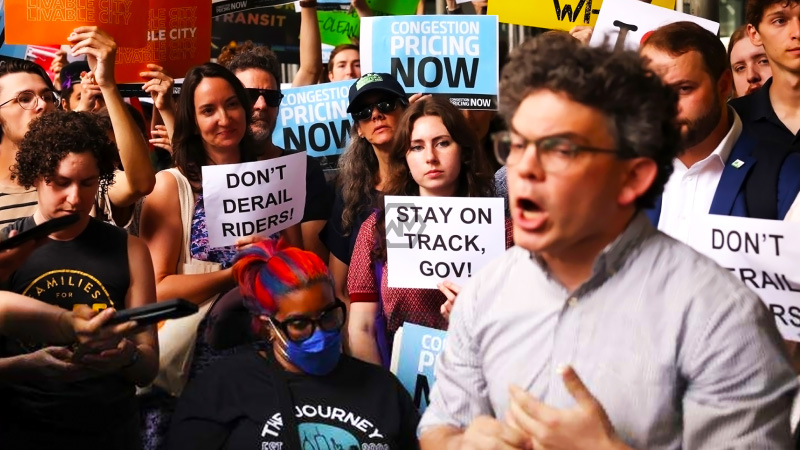- Governor Hochul’s last-minute decision halts New York City’s congestion pricing plan, citing concerns about its economic impact on working-class households.
- Business leaders lament the missed opportunity to address traffic congestion, air pollution, and fund public transit improvements.
- Advocacy groups criticize the delay, pointing out the tangible benefits congestion pricing could bring to New Yorkers’ daily commute and city infrastructure.
Governor Hochul‘s abrupt about-face on New York City’s congestion pricing plan has stirred controversy, with stakeholders expressing disappointment over the lost opportunity to tackle traffic congestion and fund public transit upgrades.
Meanwhile, businesses and advocacy groups warn of the repercussions of indefinitely delaying congestion pricing, emphasizing the toll it takes on New Yorkers’ daily lives and the city’s infrastructure.
Congestion pricing in New York: Stalled Solutions
Governor Hochul’s sudden halt to New York City‘s congestion pricing plan has sparked debate and disappointment among residents and businesses alike. The decision, made just weeks before the program’s implementation, raises concerns about the future of transportation in the city.
With congestion pricing on hold indefinitely, the potential benefits of reduced traffic congestion and improved air quality are put on hold. Additionally, critical funding for public transit upgrades hangs in the balance, leaving commuters wondering about the future of their daily journeys.
Advocates for congestion pricing argue that the delay is a setback for addressing longstanding transportation challenges in the city. Meanwhile, critics question the timing and motivations behind Governor Hochul’s decision, highlighting the need for transparent and evidence-based policymaking.
As New York City grapples with the fallout of the delayed congestion pricing plan, the debate over its merits and impacts continues to unfold. Residents and businesses await further developments, hoping for solutions that prioritize both economic equity and environmental sustainability.
In conclusion, the indefinite delay of New York City’s congestion pricing plan reflects the ongoing struggle to reconcile economic concerns with the imperative for sustainable urban transportation. As stakeholders continue to debate the merits and impacts of congestion pricing, the need for innovative solutions to address traffic congestion and fund public transit remains paramount. Ultimately, the fate of congestion pricing in New York City will shape not only the future of transportation but also the city’s broader efforts towards economic equity and environmental sustainability.
“Governor Hochul’s decision to shelve congestion pricing is a missed opportunity that will exacerbate traffic congestion and hinder efforts to fund crucial improvements to public transit.”



